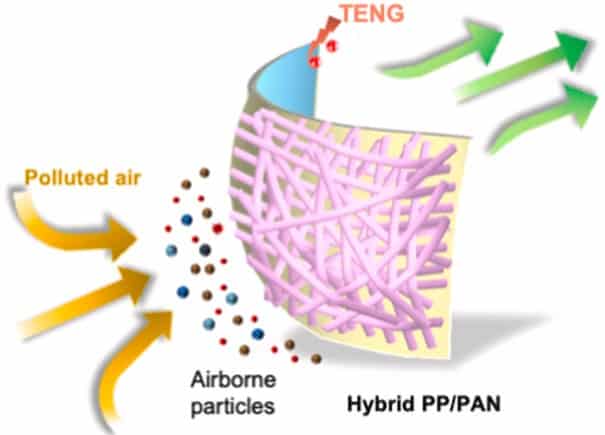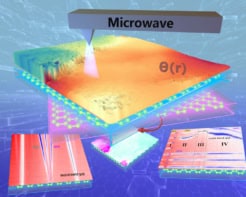
A new design for a self-powered air filter mask with enhanced removal efficiency for nano and microparticles and an extended lifetime of at least two days of continuous service has been unveiled by researchers in China.
Filter masks play an important role in our wellbeing as the presence of airborne particulate pollutants is widespread and has a negative impact on human health. Most recently, the COVID-19 pandemic has shown us the importance of using face masks as protective equipment, to prevent the respiration of hazardous particles in the environment. However, current disposable masks are unable to remove extremely small particles effectively. Another shortcoming is that they can only be used for a few hours, after which, the efficiency of filtration decreases.
In this latest research, Lingyun Wang and colleagues at City University of Hong Kong and the Chinese University of Hong Kong have discovered that the inclusion of polymeric fibres with a small diameter within the range of nanometres are the key to enhancing a mask’s ability to eliminate suspended particles. They have created a hybrid air filter using the fibres that has a porous structure, with varied pore sizes to increase the amount of filtered material.
Charge separation
However, the capture efficiency of these fibres alone is still relatively low. This is because filtration relies on the passive accumulation of particles due to the physical impact of the particles on the fibres and Brownian motion. To boost the efficiency, Wang and colleagues took advantage of the fact the polymers have a marked separation of positive and negative charges due to their large dipole moment, which can attract more particles through electrostatic interactions.
To boost the long-range attraction of the filters to negatively charged and dipolar particles in air, the team applied an external electrical field to the hybrid air filter using a triboelectric nanogenerator (TENG). Today’s N95 masks exploit a similar strategy, using charged polypropylene to attract airborne particles. However, N95 masks can only achieve this attraction for a few hours, after which their ability to attract particles decreases. By actively applying a voltage using triboelectricity, the team enhanced these electrostatic forces and increased lifespan of their filter masks to up to two days.
The researchers also harnessed the TENG to give the filter antiseptic properties by incorporating silver nanowires with the fibres. Silver has well-known antibacterial properties because it releases ions that damage bacterial proteins. This effect can be enhanced using an electric field and this allowed the team to achieve a 35% sterilization rate.
Low-cost and green energy
The TENG provides low-cost and green energy, which is harvested from the movement between two materials that generate opposite charges by contact friction. One of the materials gains electrons while the other loses them, generating an electrical current that is used to power the filter masks. Therefore, a mask can be self-powered by the wearer’s movement only, without the need for batteries or additional energy sources.
In the new device, the team connected the polymer fibres to the TENG via an electrically conductive substrate. The hybrid filtering material was tested using a custom-made set-up that produced a continuous air flow while monitoring the numbers of particles in air before and after the contact with the filtration masks.
The researchers found that the filters can operate for two days under a continuous airflow, while maintaining a high removal efficiency even for small particles. They now hope to incorporate their technology into practical lightweight facemasks that are charged using human motion.
The findings are reported in a paper in Nano Energy.



